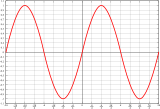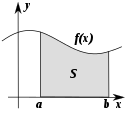Mathematics
Mathematics is the study of numbers, shapes and patterns. The word comes from the Greek word "μάθημα" (máthema), meaning "science, knowledge, or learning", and is sometimes shortened to maths (in England, Australia, Ireland, and New Zealand) or math (in the United States and Canada).[1] The short words are often used for arithmetic, geometry or simple algebra by students and their schools.
Mathematics includes the study of:
- Numbers: how things can be counted.
- Structure: how things are organized. This subfield is usually called algebra.
- Place: where things are and their arrangement. This subfield is usually called geometry.
- Change: how things become different. This subfield is usually called analysis.
Mathematics is useful for solving problems that occur in the real world, so many people besides mathematicians study and use mathematics. Today, some mathematics is needed in many jobs. People working in business, science, engineering, and construction need some knowledge of mathematics.[2][3]
Contents
Problem-solving in mathematics[change | change source]
Mathematics solves problems by using logic. One of the main tools of logic used by mathematicians is deduction. Deduction is a special way of thinking to discover and prove new truths using old truths. To a mathematician, the reason something is true (called a proof) is just as important as the fact that it is true, and this reason is often found using deduction. Using deduction is what makes mathematics thinking different from other kinds of scientific thinking, which might rely on experiments or on interviews.[4]
Logic and reasoning are used by mathematicians to create general rules, which are an important part of mathematics. These rules leave out information that is not important so that a single rule can cover many situations. By finding general rules, mathematics solves many problems at the same time as these rules can be used on other problems.[5] These rules can be called theorems (if they have been proved) or conjectures (if it is not known if they are true yet).[6] Most mathematicians use non-logical and creative reasoning in order to find a logical proof.[7]
Sometimes, mathematics finds and studies rules or ideas that we don't understand yet. Often in mathematics, ideas and rules are chosen because they are considered simple or neat. On the other hand, sometimes these ideas and rules are found in the real world after they are studied in mathematics; this has happened many times in the past. In general, studying the rules and ideas of mathematics can help us understand the world better.
Areas of study in mathematics[change | change source]
Number[change | change source]
- Mathematics includes the study of numbers and quantities. Most of the areas listed below are studied in many different fields of mathematics, including set theory and mathematical logic. The study of number theory usually focuses more on the structure and behavior of the integers rather than on the actual foundations of numbers themselves, and so is not listed in this subsection.
Natural numbers Integers Rational numbers Real numbers Complex numbers Ordinal numbers Cardinal numbers Arithmetic operations Arithmetic relations Functions
Structure[change | change source]
- Many areas of mathematics study the structure that an object has. Most of these areas are part of the study of algebra.
Shape[change | change source]
- Some areas of mathematics study the shapes of things. Most of these areas are part of the study of geometry.
Change[change | change source]
- Some areas of mathematics study the way things change. Most of these areas are part of the study of analysis.
Applied mathematics[change | change source]
- Applied mathematics uses mathematics to solve problems of other areas such as engineering, physics, and computing.
- Numerical analysis – Optimization – Probability theory – Statistics – Mathematical finance – Game theory – Mathematical physics – Fluid dynamics - computational algorithms
Famous theorems[change | change source]
These theorems have interested mathematicians and people who are not mathematicians.
- Pythagorean theorem – Fermat's last theorem – Goldbach's conjecture – Twin Prime Conjecture – Gödel's incompleteness theorems – Poincaré conjecture – Cantor's diagonal argument – Four color theorem – Zorn's lemma – Euler's Identity – Church-Turing thesis
These are theorems and conjectures that have greatly changed mathematics.
- Riemann hypothesis – Continuum hypothesis – P Versus NP – Pythagorean theorem – Central limit theorem – Fundamental theorem of calculus – Fundamental theorem of algebra – Fundamental theorem of arithmetic – Fundamental theorem of projective geometry – classification theorems of surfaces – Gauss-Bonnet theorem – Fermat's last theorem
Foundations and methods[change | change source]
Progress in understanding the nature of mathematics also influences the way mathematicians study their subject.
- Philosophy of Mathematics – Mathematical intuitionism – Mathematical constructivism – Foundations of mathematics – Set theory – Symbolic logic – Model theory – Category theory – Logic – Reverse Mathematics – Table of mathematical symbols
History and the world of mathematicians[change | change source]
Mathematics in history, and the history of mathematics.
- History of mathematics – Timeline of mathematics – Mathematicians – Fields medal – Abel Prize – Millennium Prize Problems (Clay Math Prize) – International Mathematical Union – Mathematics competitions – Lateral thinking – Mathematics and gender
Awards in mathematics[change | change source]
There is no Nobel prize in mathematics. Mathematicians can receive the Abel prize and the Fields Medal for important works.[8][9]
The Clay Mathematics Institute has said it will give one million dollars to anyone who solves one of the Millennium Prize Problems.
Mathematical tools[change | change source]
There are many tools that are used to do mathematics or to find answers to mathematics problems.
- Older tools
- Newer tools
- Calculators and computers
- Programming languages
- Computer algebra systems (listing)
- Internet shorthand notation
- statistical analysis software (for example SPSS)
- SAS programming language
- R programming language
References[change | change source]
- ↑ Waldman, Katy (2014-12-08). "Why Do Brits Say Maths and Americans Say Math?". Slate. ISSN 1091-2339. Retrieved 2018-07-30.
- ↑ "Thinking of a Career in Applied Mathematics? | SIAM". www.siam.org. Retrieved 2018-07-30.
- ↑ Wigner, Eugene (February 1960). "The Unreasonable Effectiveness of Mathematics in the Natural Sciences". Communications in Pure and Applied Mathematics 13: 1-14. https://www.dartmouth.edu/~matc/MathDrama/reading/Wigner.html.
- ↑ "The science checklist applied: Mathematics". undsci.berkeley.edu. Retrieved 2018-08-05.
- ↑ "The Role of Generalization in the Advanced Mathematical Thinking". AMS Grad Blog. 2016-08-21. Retrieved 2018-08-07.
- ↑ Houston, Kevin (2009). How to Think Like a Mathematician. Cambridge University Press. p. 99. ISBN 978-0-521-71978-0.
- ↑ Thurston, William (April 1994). "On proof and progress in mathematics". Bulletin of the American Mathematical Society 30: 161-177. https://arxiv.org/pdf/math/9404236.pdf.
- ↑ Ronan, Mark (2014-08-13). "The Fields Medal is the greatest prize in maths". ISSN 0307-1235. Retrieved 2018-08-07.
- ↑ Bellos, Alex (2018-03-20). "Abel Prize 2018: Robert Langlands wins for 'unified theory of maths'". the Guardian. Retrieved 2018-08-07.
Other websites[change | change source]
| The Simple English Wiktionary has a definition for: mathematics. |
| Wikimedia Commons has media related to Mathematics. |
- Mathematics Citizendium
- Mathematics at the Open Directory Project
























